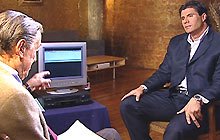 A phone call from a “60 Minutes” or “20/20” producer used to strike fear in the hearts and minds of PR pros everywhere. This was especially true if the call arrived at the final stages of production of a likely critical segment. After all, investigative news journalists held all the cards, or so it seemed.
A phone call from a “60 Minutes” or “20/20” producer used to strike fear in the hearts and minds of PR pros everywhere. This was especially true if the call arrived at the final stages of production of a likely critical segment. After all, investigative news journalists held all the cards, or so it seemed.
What if we insisted that we be allowed to tape the interview in exchange for granting access to our newsmaker client? To our surprise, in 1985, “60 Minutes” agreed, but with one ground rule: our cameras shut down when theirs did. Henceforth, the playing field was at least partially leveled.
In a piece today that has all sorts of ramifications for PR practitioners, New York Times newspaper beat reporter Katharine Seelye (finally) reports on how unedited source material can be used in this day and age to give an interviewee a leg up on the interviewer. Unlike the “60 Minutes” example wherein PR pros remained at the mercy of other TV (or print) news gatekeepers to carry a client’s unedited (non-reported) perspective, the advent of publicly accessible, RSS-enabled weblogs, podcasts and other forms of digital content delivery can make any newsmaker a news producer as well.
Dallas Mavs owner, tech mogul and widely linked-to blogger Mark Cuban demonstrated this tact so effectively this past summer when he posted his unedited e-mail exchange with Andrew Ross Sorkin, Ms. Seelye’s colleague on the Times’s business pages. Mr. Cuban was miffed by a piece Mr. Sorkin had written in which he believed his comments were taken out of context.
PR maven Howard Rubenstein’s supposedly smarter son Steven had this to say:
“…a corporation must also consider whether publishing such material would alienate an influential beat reporter as well as an entire news outlet and possibly reporters for other outlets. ‘You have to balance the incident over the long-term relationship,’ he said. ‘But you can get your side out in a benign way. It doesn’t have to be antagonistic.'”
Right. It may be okay for Mr. Cuban to blindside The Times’s lead M&A reporter, but for most of us whose livelihoods rely on honest and mutually dependent relationships with mainstream reporters, it is not a practice to be considered lightly or without the cognizance and consent of the inquiring journalist.